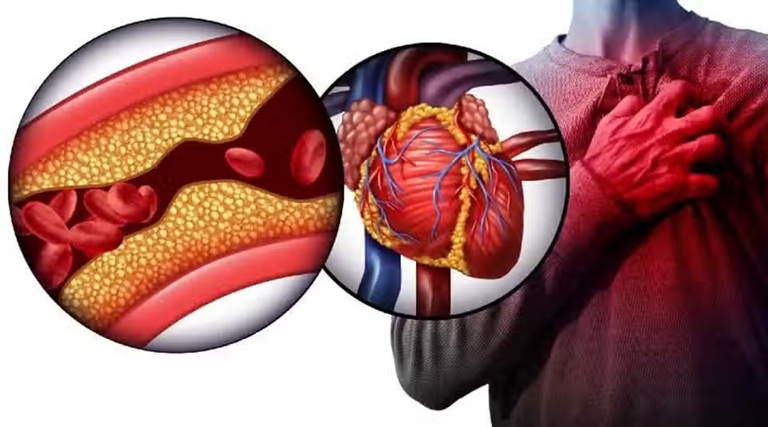5 Warning Signs Your Heart Arteries May Be Blocked
Heart disease remains the leading cause of death worldwide, and one of the most dangerous yet preventable forms of it is coronary artery disease (CAD), where the arteries that supply blood to the heart muscle become narrowed or blocked. These blockages are usually caused by plaque buildup—a mix of cholesterol, fat, calcium, and other substances. While some people may not experience any symptoms until a heart attack strikes, there are often warning signs that should not be ignored.
Here are 5 red flags that could indicate your heart veins are blocked and that it’s time to see a doctor immediately:
1. Chest Pain or Discomfort (Angina)
This is the most classic and recognizable symptom of blocked arteries. Chest pain related to heart issues is often described as pressure, squeezing, fullness, or a burning sensation in the center or left side of the chest. It may feel like someone is sitting on your chest.
Key characteristics:
Usually occurs during physical exertion or emotional stress.
May go away with rest or medication (like nitroglycerin).
Can last a few minutes or come and go.
Angina occurs when your heart isn’t getting enough oxygen-rich blood due to narrowed or blocked arteries. While not all chest pain signals heart disease, any unexplained or persistent discomfort in the chest should be taken seriously.
2. Shortness of Breath
If you find yourself gasping for air after mild activity, such as walking up a flight of stairs or carrying groceries, this could be a red flag. When your heart can’t pump blood efficiently due to blocked arteries, your lungs don’t get enough oxygen, making it hard to breathe.
Other clues to look for:
Difficulty breathing while lying flat (orthopnea).
Waking up gasping for breath at night (paroxysmal nocturnal dyspnea).
Fatigue accompanying breathlessness.
Shortness of breath is particularly concerning when it’s a new symptom or worsens over time, especially when combined with other signs like chest discomfort or fatigue.
3. Pain or Discomfort in Other Areas of the Body
Blocked heart arteries can cause referred pain in parts of the body other than the chest, due to shared nerve pathways. Many people—especially women—experience atypical symptoms during a cardiac event.
Common areas for referred pain:
Neck
Jaw
Left shoulder or both shoulders
Back
Arms (especially the left)
The pain may come on suddenly and can be sharp, dull, or pressure-like. If you’re experiencing pain in these areas—especially if it comes with nausea, sweating, or lightheadedness—it’s time to seek emergency help.
4. Extreme Fatigue
Unusual or excessive tiredness, especially if it’s persistent and not relieved by rest, can be an early indicator of heart disease. This is more commonly reported among women but affects all genders.
Blocked arteries restrict blood flow, making the heart work harder to pump oxygen throughout the body. This results in physical exhaustion even from routine tasks.
Warning signs of cardiac-related fatigue:
Feeling drained after minimal exertion.
Needing more sleep than usual.
Struggling to stay awake or concentrate.
If you’re always tired and can’t pinpoint a cause (such as sleep disorders, depression, or anemia), it’s wise to get a cardiac evaluation.
5. Sweating, Nausea, or Dizziness
Sudden cold sweats, unexplained nausea, or dizziness may be signs of a heart attack due to blocked arteries.
Why it happens:
The heart’s struggle to circulate blood triggers a “fight or flight” response, activating sweat glands.
Lack of blood flow to the brain can cause dizziness or fainting.
The body may respond to cardiac distress with nausea or vomiting, mimicking gastrointestinal symptoms.
These symptoms often fly under the radar, especially when not accompanied by chest pain. However, in the presence of risk factors like diabetes, high blood pressure, or family history of heart disease, such symptoms should raise immediate concern.
When to Seek Medical Attention
If you’re experiencing any of these symptoms—especially in combination—don’t delay. Many people dismiss early signs of blocked arteries, attributing them to indigestion, stress, or aging. But early detection can prevent serious consequences like heart attacks, strokes, or sudden cardiac death.
Call emergency services if you experience:
Chest pain lasting more than a few minutes.
Shortness of breath that worsens.
Sudden fainting or collapse.
Severe pain in the jaw, back, or arm.
Final Thoughts: Don’t Ignore the Signs
Heart disease often develops silently, but the body usually gives clues. By recognizing these red flags early and seeking medical evaluation, you can potentially save your life or the life of someone you love.
Prevention is also key. Regular health check-ups, maintaining a healthy diet, exercising, and quitting smoking significantly reduce your risk of artery blockages.
Remember: your heart talks—listen to it.



